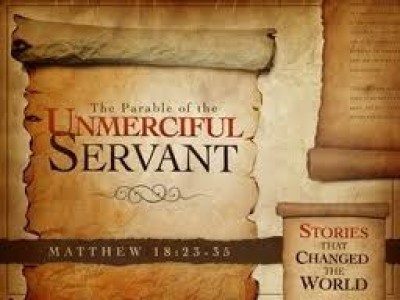It may be a story that changed the world but it doesn’t seem to have changed the church much. One of our synod officials recently said that he was appalled at how much unreconciled conflict existed in our life together. Unreconciled conflict is an inability or unwillingness to forgive as we have been forgiven. Luther had a lot to say about this in his sermon on Matthew 18…….
This is what we have often said, that we Christians must break forth, and show by our deeds and before the people that we have the true faith. God does not need your works, he has enough in your faith. Yet he wants you to work that you may show thereby your faith to yourself and all the world. For God indeed sees faith, but you and the people do not yet see it, therefore you should devote the works of faith to the benefit of your neighbor. Thus this servant is an example and picture of all those who should serve their neighbor through faith.
24. But what does he do? Just as we who think we believe, and partly do believe, and rejoice that we have heard the Gospel and can say a great deal about it; but no one wants to follow it in his life. We have brought matters so far, that the doctrine and jugglery of the devil have been partly overthrown, and we now see what is right and what is wrong, that we must deal with God alone through faith, but with our neighbor through our works. But we cannot bring it to pass, that, as to love, one does to another as God has done to him; as we ourselves complain that some of us have become much worse than they were before.
25. As this servant will not forgive his neighbor, but seeks to collect his claim; so we also do and say: I am not in duty bound to give what is my own to another, and yield my rights. If another has offended me, he owes it to me to reconcile me and ask pardon. For thus the world teaches and acts. And here you are right, and no prince or king will compel you to give to another what is your own; but they must permit you to do what you wish with your own. The civil government only compels so far, that you may not do with another’s goods what you would, not that you must give your goods to another. This is right before the world, as reason concludes: To every one belongs his own. Therefore, he does not do wrong, who uses his goods as he will, and robs no one of his own.
26. But what says this Gospel? If God also would have acted thus and had maintained his right and said: I act in harmony with justice, when I punish the wicked and take what is my own, who will prevent me? where then would we all be? We would all go to ruin. Therefore, because he has given up his claim on thee, he desires that you too should do likewise. Therefore, also give up your right and think: If God has given me ten thousand pounds, why should I not give my neighbor a hundred shillings?
27. Thus your goods are no longer your own, but your neighbor’s. God could indeed have kept his own, for he owed you nothing. Yet he gives himself wholly unto you, becomes your gracious Lord, is kind to you, and serves you with all his goods, and what he has is all yours; why then will you not also do likewise? Hence, if you wish to be in his kingdom you must do as he does; but if you want to remain in the kingdom of the world, you will not enter his kingdom. Therefore the sentence in Matthew 25:42, which Christ will speak on the last day belongs to those who are not Christians: “For I was hungry, and ye did not give me to eat; I was thirsty, and ye gave me no drink,” and so on.


